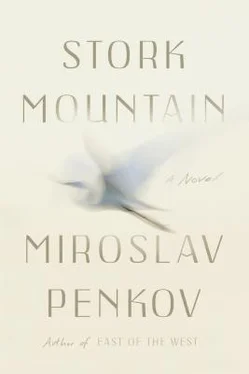Miroslav Penkov - Stork Mountain
Здесь есть возможность читать онлайн «Miroslav Penkov - Stork Mountain» весь текст электронной книги совершенно бесплатно (целиком полную версию без сокращений). В некоторых случаях можно слушать аудио, скачать через торрент в формате fb2 и присутствует краткое содержание. Год выпуска: 2016, Издательство: Farrar, Straus and Giroux, Жанр: Современная проза, на английском языке. Описание произведения, (предисловие) а так же отзывы посетителей доступны на портале библиотеки ЛибКат.
- Название:Stork Mountain
- Автор:
- Издательство:Farrar, Straus and Giroux
- Жанр:
- Год:2016
- ISBN:нет данных
- Рейтинг книги:4 / 5. Голосов: 1
-
Избранное:Добавить в избранное
- Отзывы:
-
Ваша оценка:
- 80
- 1
- 2
- 3
- 4
- 5
Stork Mountain: краткое содержание, описание и аннотация
Предлагаем к чтению аннотацию, описание, краткое содержание или предисловие (зависит от того, что написал сам автор книги «Stork Mountain»). Если вы не нашли необходимую информацию о книге — напишите в комментариях, мы постараемся отыскать её.
Stork Mountain — читать онлайн бесплатно полную книгу (весь текст) целиком
Ниже представлен текст книги, разбитый по страницам. Система сохранения места последней прочитанной страницы, позволяет с удобством читать онлайн бесплатно книгу «Stork Mountain», без необходимости каждый раз заново искать на чём Вы остановились. Поставьте закладку, и сможете в любой момент перейти на страницу, на которой закончили чтение.
Интервал:
Закладка:
“Tell me,” she asked Attila, who, tangled in her tresses, was sharpening his saber on a deer hoof. “Where have you been? What have you seen?”
He was afraid to look her in the eyes. He’d never felt like this before. He said, “For ten thousand days I saw nothing but steppe and sky. Then I saw a city of silver. I thought of stopping there to drink its water, to eat whatever food its king would give. I thought of lying under the shade of silver trees. Instead, I slew the king, and burned the city, and turned it into a silver lake. I rode ten thousand days through steppe and sky and came upon a golden tower. Inside the tower, like storks in a cage, a thousand women slept — a woman of every human tribe. I thought of climbing up the tower to look at all the world. I thought of bedding the women so they might bear me one thousand sons. A son from every human tribe. Instead, I brought the tower to its ruin. The women we trampled with our hooves. Our hooves are golden now.
“Three hundred years without repose,” he said. “I cannot stop. I must ride on.”
“Take me with you,” she begged again. And then she told him of her hair and of her father, the great, almighty god.
“There is one god,” he said, jumping to his feet as if to prove it, and brought his saber down. In vain, he hacked at Lada’s hair. In vain, he tried to slash it.
“You fool,” she said. “I am a god as well.”
“There is one god,” he said a final time, and sprinted to his horse.
At this point in the story, Grandpa usually paused and leaned closer, his whisper hoarse from all the talking, his breath scathing my ear. “An ancient scribe once wrote of how the Huns made the Yantra River disappear. So horrific was the multitude of Huns who crossed the Yantra River , the scribe wrote on his parchment, that by the eleventh day of their crossing, their hooves had severed the river in two. By the twentieth day the Yantra was flowing backward, and by the twenty-fourth, it had disappeared whence it had come.
“No ancient scribe can tell you why all this happened,” Grandpa would whisper, “but I can. Imagine, the golden hooves pounding the riverbed! A hundred horses, then a thousand. A hundred thousand. By the fifth day Lada’s hair was starting to split, tress by tress. By the eleventh the Huns had severed it completely.”
Perun awakened. He reeled, and gathered Lada’s hair back to his mountain, the way one gathers a fishing seine. What horror the old fool felt to see no Lada where the tresses ended.
Lada was free. Short-haired, she flew behind Attila and on her wings flew Spring and Beauty. Where the Huns passed, beautiful death followed. And from the funeral pyres, bright peonies bloomed.
PART THREE
ONE
AND AFTER THIS IT RAINED, melodramatically, for many months. Or at least it seemed so from underneath the stifling Rhodopa blanket, which scratched my cheeks each time I tossed and turned. Quite frankly, I felt ashamed. Quite frankly, I couldn’t help it. Beyond the window glass rippled with age, over the hills in the distance, black waves were clashing with blacker. Greek clouds tore into Turkish and battled with our own. Back in the day, Grandpa told me, on the eve of the first Balkan War, even the clouds here had been forced to pledge allegiance to a single nation. “It’s raining Turkish rain today,” he’d say, then sit at the foot of my bed and force me to drink a cup of mursal tea. “Only Turkish rain touches this softly. And Turkish girls.” He’d laugh in an attempt to cheer me, but I would stare into the steam.
“Get up, my boy,” he’d cry an hour later, and throw the window open. “Two days is plenty to toss about in bed. Come help me tie the tomatoes. The wind’s knocked over some of their poles.” Instead, I buried myself in the blanket and waited to hear his fading steps.
Each day he worked the garden, went for bread and yogurt to the Pasha Café, even rode the bus to town — a business trip, he told me, which would have been a great deal more bearable with my pleasant person by his side.
“A sacrilege! Three days in bed!”
“My boy, how can I say this nicely: you stink like a widowed badger. Run and shower in the rain, then help me fix the frame for the cucumbers.”
“Five days! A heart of briar jelly would mend itself in four!”
Each time he came to my room, I wanted him to leave. Each time he left, I wanted him to barge back in. What a tragic waste of precious time, I thought, and watched him act the clown, shoulders slouched at the foot of my bed. For shame, I told myself. Get up. There is no time to waste with broken hearts.
“It lashes bad,” he’d say some days. “It stabs like a dagger to the back. Greek rain.” He would expel the words like spittle. A long while he would watch the stork nest on the roof of the house closest to ours: one stork braving the sideways-falling rain, brooding the eggs, the other fetching mice, frogs, little snakes; the two switching places. Grandpa would tick his tongue. “If it rains another week like this…,” he’d say, but never finish.
On the sixth day of my self-imposed home incarceration Grandpa rapped on the door and, completely disregarding my cry to wait, stormed in. He held a nylon sack of bread and with the same hand struggled to close his umbrella. “It’s stuck again, the brute,” he muttered, without once looking up, shaking the umbrella and spraying water on me, on my desk, on the map of the ancient world behind me. Then, almost as an afterthought, he added, “Look who I found outside, standing in the rain, afraid to knock.”
“Grandpa,” I started to say, but still fighting the umbrella he stepped aside to let Elif pass through. She appeared in the doorframe so drenched, so shrunken in size, so despondent with her headscarf glued to her cheeks, with the sleeves of her jacket soaked and droopy, that I have no idea from where that burst of sudden laughter came.
“Yes, laugh,” I told her, standing helplessly naked in the middle of the room, the pair of clean boxers I’d meant to change into treacherously far away in the wardrobe. “You too, Grandpa. Laugh it out.”
A joyous grin on his face, he handed me the open umbrella. And while I hurried to cover up he spoke to Elif, still grinning, predictably as coarsely as he could. “Chilly rain today, Elif. Bulgarian.”
TWO
HER TEETH CHATTERED; her shoulders rocked. Water dripped from her jacket and drummed on the carpet, yet she refused to take it off. I offered her a blanket, but she said no, she wasn’t cold. “Nonsense,” Grandpa said, back from the kitchen, and ordered me to look away. When I looked again, Elif’s jacket had been stretched to dry on the hanger in the corner and she was wrapped in a cocoon of wool. The old man shoved a steaming cup into her hands, and as she brought it to her lips some tea splashed on the headscarf, now spread in her lap. “With extra honey,” he said, and did not move until she’d taken a few small sips.
At the threshold, he stopped. “I have much work to do,” he lied, “and will be in my study. If you want more tea, the boy can brew it.” He hesitated, then at last chose to leave the door wide open.
By now, some color had flushed Elif’s cheeks and the purple of her lips had begun to turn scarlet. She steamed under the blanket, the stench of wet wool mixing with the reek of my six-day sweat and fogging up the window so that I no longer recognized the yard, the rooftops, and the storks.
“Nice fire truck,” Elif said, and nodded at the toy by my desk. I told her the ladder was telescopic, meaning it expanded when there was need, to which she said, “I know what ‘telescopic’ means.” And then, “I bet it does.”
Читать дальшеИнтервал:
Закладка:
Похожие книги на «Stork Mountain»
Представляем Вашему вниманию похожие книги на «Stork Mountain» списком для выбора. Мы отобрали схожую по названию и смыслу литературу в надежде предоставить читателям больше вариантов отыскать новые, интересные, ещё непрочитанные произведения.
Обсуждение, отзывы о книге «Stork Mountain» и просто собственные мнения читателей. Оставьте ваши комментарии, напишите, что Вы думаете о произведении, его смысле или главных героях. Укажите что конкретно понравилось, а что нет, и почему Вы так считаете.











